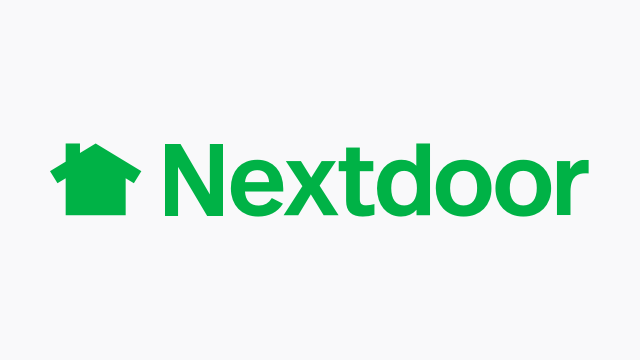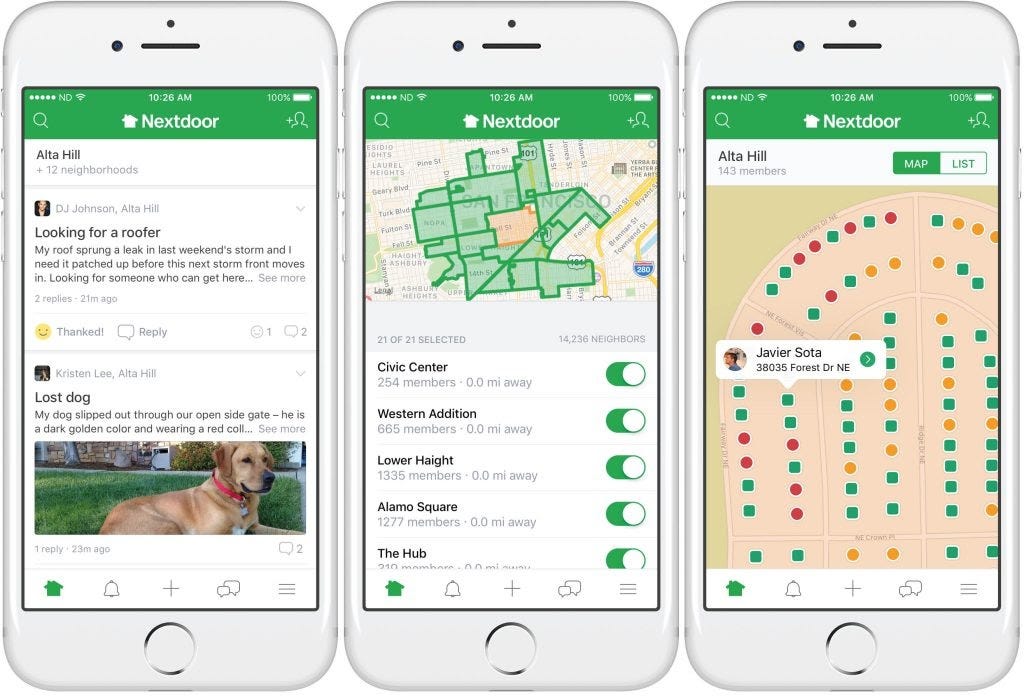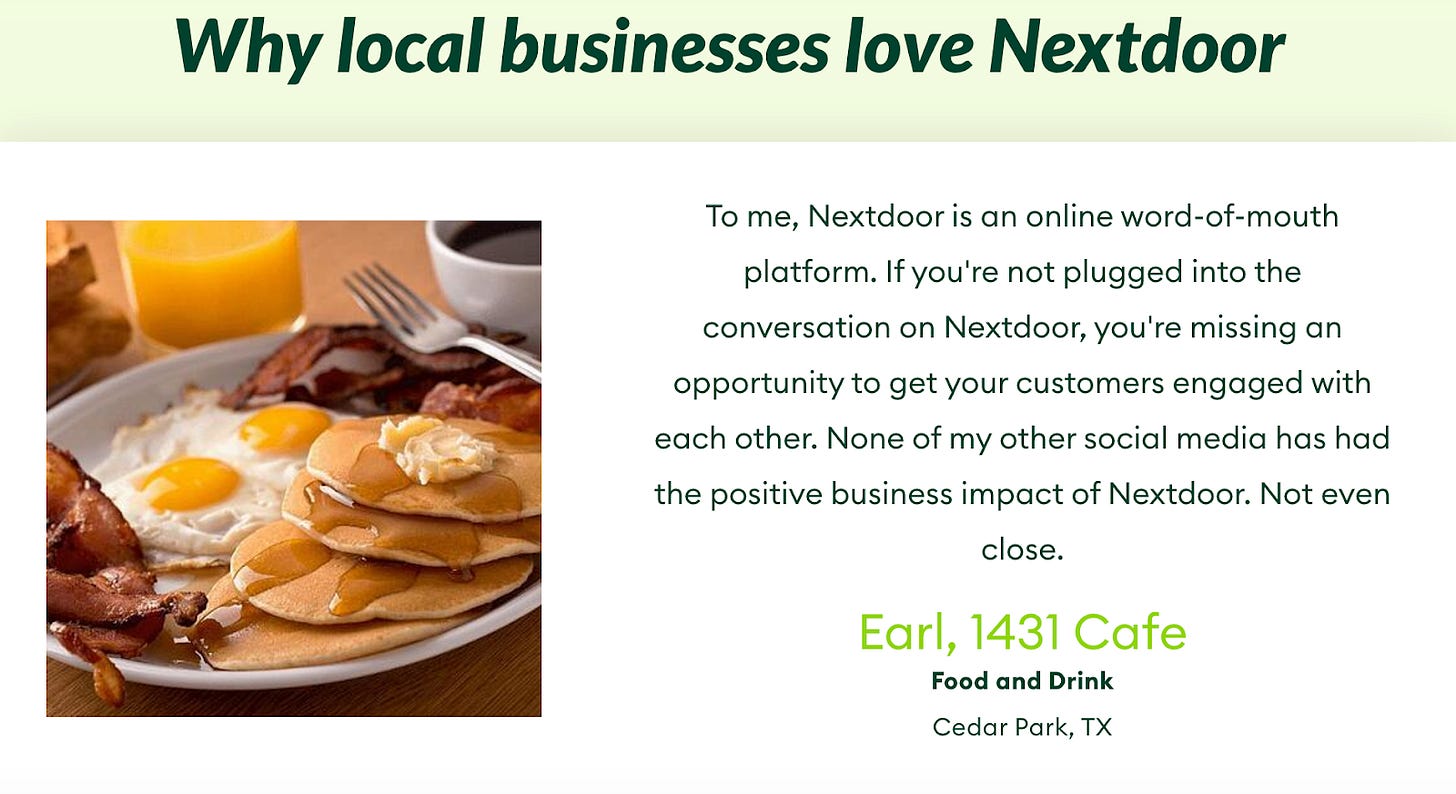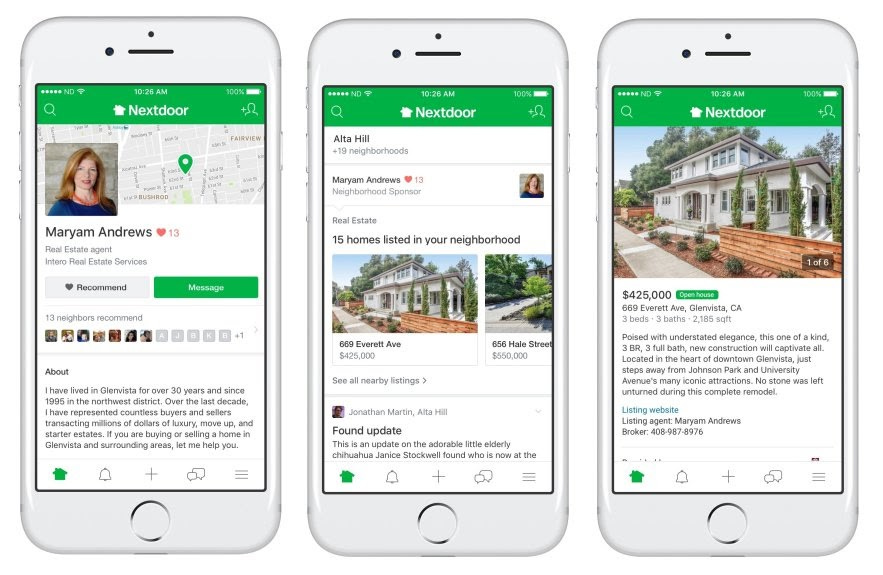#14 Nextdoor: I need a foot in this door
Nextdoor is a hyperlocal social networking platform for neighborhoods. The site aims to bring communities together to share resources, ask questions, support local businesses, and ensure safety.
Nextdoor by the numbers:
11 countries
276,000 neighborhoods globally
1 in 4 U.S. households
52 million local business recommendations from neighbors
A neighborhood you can rely on
Nextdoor is a fascinating company as it provides a platform for the communities to connect in ways everyone aspires to. The platform uniquely captures value as it truly translates the sense of physical proximity that we as humans really value. Neighborhoods truly help communities connect by helping all stakeholders interact and have someone to rely on. According to the company, a neighborhood encapsulates the following stakeholders:
Residents: Residents in the physical boundaries of the neighborhood. One can interact with them through the platform.
Local businesses & brands: Instantly reach targeted customers who have a high probability of being customers.
Non-profits & Public agencies: Engage with the community and individuals to find support, share critical, real-time information directly at the neighborhood level.
Built with the vision of connecting communities and helping local businesses.
Focus on quality
Since its inception, Nextdoor has been hyperfocused on the quality of neighborhoods that are created. This means that they have taken measures to create a platform that has the following characteristics:
Size: Every neighborhood leader(individuals who start the neighborhood) needs to add 9 neighborhood members to make the neighborhood real and representative rather than just an echo chamber.
Local: To ensure efficiency, Nextdoor requires every leader to carve out their neighborhood to define physical boundaries. Even though historically these encapsulate larger physical spaces than real neighborhoods, the boundaries correctly showcase who is included in the neighborhood.
Crowdsourced: All data on the platform and in each neighborhood is crowdsourced by members of the community. This helps create a sense of belonging and enhances user experience.
Verifications: All users are required to sign up with their real names – aliases and pseudonyms are not allowed.
These measures have gone a long way to create a platform where users feel safe to engage and find significant value from the platform.
Online word of mouth: Helping local businesses
The company’s business model is built around advertisements, deals, and sponsorships. This is special as it creates a flywheel where members drive higher engagement to benefit from the platform’s community and individual financial gains. Key characteristics of the platform:
Recommendations from known individuals: Nextdoor is able to help build superior customer relationships and drive up the brand name as individuals see recommendations from known individuals of the community.
Targeted advertising and higher engagement: The platform is uniquely positioned to generate more targeted traffic for all kinds of businesses. Nextdoor has exploited this potential by going after local businesses and real estate agents, and there is so much more to come. Overall, the platform has claimed to have 7% engagement on ads which is well above the industry average of 2%.
Most importantly, a neighorhood is hard to kick off, but the overall brand name strengthens as the platform becomes a one-stop-shop for overall community interactions.
Strong COVID-19 tailwinds
Nextdoor has seen massive growth in both signups and engagement over the last year due to the COVID-19 pandemic. The platform has emerged as the most popular medium for all community stakeholders to stay safe and connected. There is firsthand evidence of this as individuals like Lewis Reed of St. Louis explained how public agencies and law enforcement are actively using Nextdoor to disperse critical health and safety information.
Sarah Friar, Nextdoor’s CEO, said the following in an interview with McKinsey in January 2021: “We saw almost an 80 percent lift month over month in our daily active members, and a lot of it was from people looking for ways to help in their community.”
Revenue model consists of the following revenue streams:
Sponsored posts
Local deals
Neighborhood sponsorships
The key is that all of these models inherently help the consumer and creates a sense of belonging in the community.
Fundraising & Upcoming IPO
The company raised $170 million of Series H venture funding in a deal led by Riverwood Capital on September 10, 2019, putting the company's pre-money valuation at $2 billion. The company also has plans to go public later this year at a valuation of $5-$6 B. I believe Nextdoor is exactly the kind of company that would benefit from either direct listing or a SPAC. The business potential of Nextdoor is enormous, and the company is fairly early in actually monetizing this potential. Along with that, the Nextdoor board comprises individuals like Bill Gurley(one of my investing idols) who has been a stark critic of the IPO process because of the high regulatory requirements, long hauled process, and significant money left on the table.
Vigilantism & misinformation
Nextdoor was able to identify that security is one of the most important parts of any neighborhood and the fact that we rely highly on individuals around us for mutual safety. But this feature has been highly controversial as its given rise to a false sense of danger amongst the users. As described in a Vox article: “These apps have become popular because of — and have aggravated — the false sense that danger is on the rise. Americans seem to think crime is getting worse, according to data from both Gallup and Pew Research Center. In fact, crime has fallen steeply in the last 25 years according to both the FBI and the Bureau of Justice Statistics.”
Since 2015, the company has made significant efforts to combat these problems. A short excerpt about it in a Fast Company article, “Nextdoor built Kindness Reminder based on the work of another academic, Stanford psychologist Jennifer Eberhardt, who studies bias in policy and is the author of Biased: Uncovering the Hidden Prejudice That Shapes What We See, Think, and Do. Eberhardt had worked with Nextdoor since 2015, helping the company craft a narrow solution in the wake of its racial-profiling scandal (reports of crimes would need to include more than just race), and is a member of its advisory board.”
Each neighborhood has some designated moderators who help moderate the content on all pages. Like any other social media platform, this is a manual process, has led to major disputes in the communities themselves. The platform hasn't found a good way to combat both of these problems, which I believe are fairly serious issues.
Lack of monetization
Nextdoor is one of the only platforms that has been able to curate this incredible local community and built a multi billion-dollar businesses around it. But with its distribution networks and reach, one would expect much higher revenue numbers and valuation. This begs the question about why Nextdoor isn't working with large local chains across the country.
To conclude, I believe that Nextdoor is an incredible platform that has become fundamental to millions of households. The company has incredible potential, and I’m bullish on its future endeavors.







